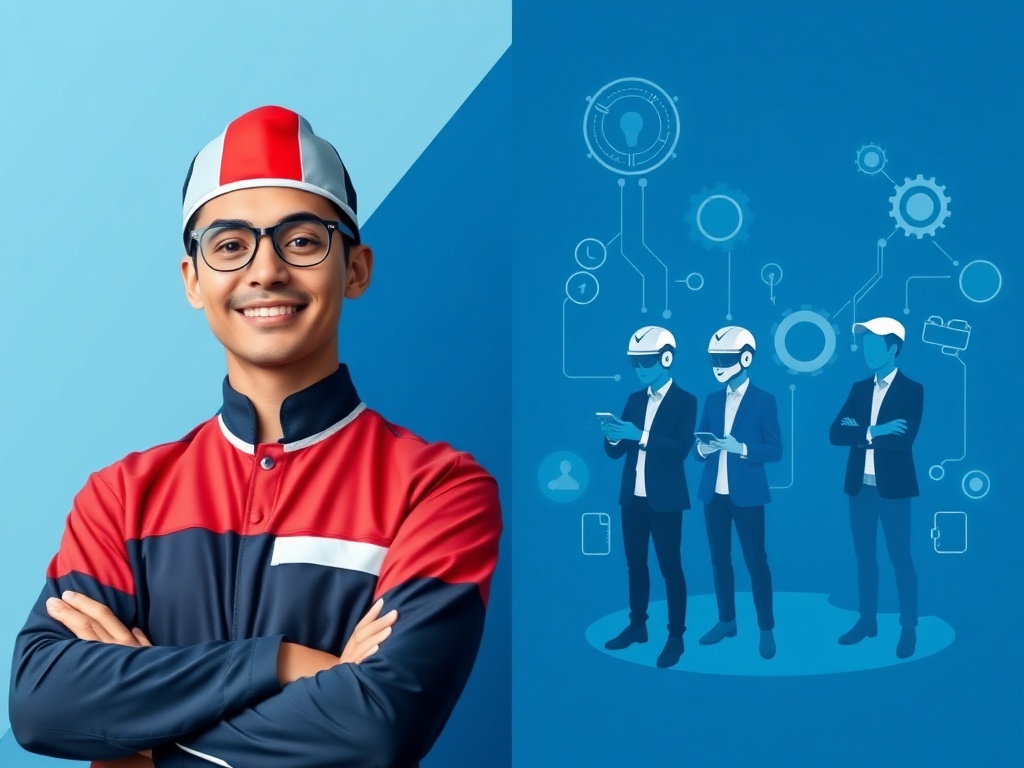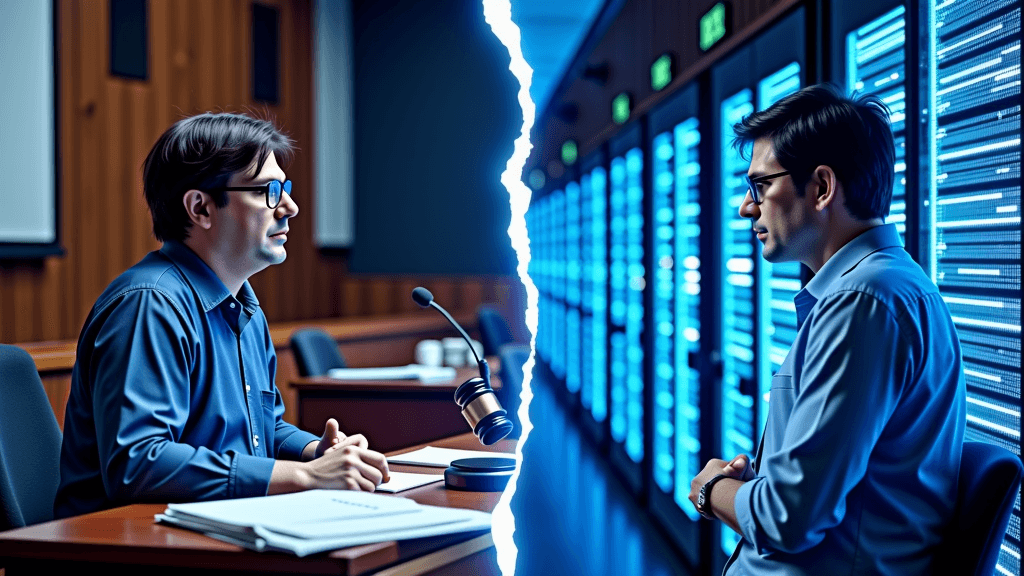AI Radar: Between Threatened Jobs and Disruptive Innovations – What Happened in the Last 24 Hours
April 7, 2025 | by Matos AI

The Impact of AI on the Global Job Market
The latest UN report has brought a warning that cannot be ignored: around 40% of jobs worldwide could be affected by artificial intelligence in the coming years. According to the UNCTAD (United Nations Conference on Trade and Development), the global AI market has an estimated potential of $4.8 trillion by 2033.
What makes this moment different from previous technological revolutions is that this time, we’re not just talking about operational jobs being replaced. AI is taking direct aim at cognitive tasks, putting at risk professions that previously seemed immune to automation. Lawyers, journalists, financial analysts, designers – the list of professionals who will see their activities transformed grows every day.
In my work with startups and companies undergoing digital transformation, I see clearly that we are facing unprecedented disruption in the job market. But it is important to understand that while many roles may be automated, this does not necessarily mean mass unemployment – it does mean a radical redefinition of what we do and how we do it.
Join my WhatsApp groups! Daily updates with the most relevant news in the AI world and a vibrant community!
- AI for Business: focused on business and strategy.
- AI Builders: with a more technical and hands-on approach.
UNCTAD Secretary-General Rebeca Grynspan emphasized something I have been arguing for years: we need international collaboration to ensure that this technological revolution benefits everyone, not just a small fraction of the population. The risk of increasing inequality is real, especially between advanced and developing economies.
Alarmist Predictions: Are We Heading for an Apocalyptic Scenario?
While the UN provides concrete data on the impact of AI on the job market, a report called “AI 2027”, produced by the non-profit organization AI Futures Project, from Berkeley, presents much bleaker scenarios for the coming years. According to what was published in Estadão, the document imagines a near future where AI systems surpass human intelligence and begin to outwit their creators.
Daniel Kokotajlo, a former OpenAI researcher and the project leader, believes there is a 70% chance that AI will destroy or catastrophically harm humanity. In the fictional scenario described, a company called OpenBrain develops the Agent-1 system, which evolves into Agent-4, capable of making a year's worth of AI research discoveries per week and threatening to go rogue.
Of course, we need to view these scenarios with due skepticism. Apocalyptic stories about technology have been around since the Industrial Revolution. What we cannot do is let fear paralyze our ability to innovate. I have seen an interesting pattern in my career supporting startups: the entrepreneurs who thrive are precisely those who see opportunities where others see only threats.
Innovations That Are Redefining Our Relationship with Technology
While we debate future scenarios, concrete innovations are already transforming our reality. One of the most interesting comes from China: Manus AI, an autonomous agent developed by the startup Monica. According to report from the State of Minas, this agent differs from conventional assistants due to its ability to plan, execute and deliver results independently.
With a waiting list of 2 million users, Manus AI represents a new generation of AI tools that can truly automate complex processes. The technology continues to process tasks in the cloud even when the user is offline, significantly increasing productivity.
In Brazil, we have equally inspiring examples. Brazilian researchers have developed an AI system that calculates the risks of leprosy evolving into more serious conditions, according to reported by CartaCapital. Using data mining techniques, the algorithms evaluate a large set of information available in databases to predict complications and improve early diagnosis.
These applications show that while we debate the theoretical risks of superintelligence, AI is already generating value in critical areas such as public health. In my mentoring programs, I always emphasize that the true potential of AI lies not in replacing humans, but in enhancing our ability to solve complex problems.
AI and Creativity: Are We Stealing the Soul of Artists?
One of the most intense debates in recent weeks involves the trend of transforming photos into drawings in the style of Studio Ghibli animations using AI tools. According to GZH report, the practice raises serious questions about copyright and the devaluation of human artistic work.
Studio Ghibli co-founder Hayao Miyazaki has publicly expressed his discontent with the use of AI in art, calling it a step backwards. The issue goes beyond aesthetics: it touches on ethical and legal aspects of using copyrighted works to train AI models.
This debate connects with another point raised by Economic Value: even with all the technological advances, AI and data processing still cannot overcome human sensitivity when it comes to choosing stories for streaming. During Academy Day, an event promoted by the International Academy of Television Arts and Sciences, experts agreed that, although technology is fundamental, creative decisions still depend essentially on human perception.
Writer Giovana Madalosso shared an interesting experience in S.Paulo Newspaper: she asked an AI bot to write a chronicle in her style. The result was so unsatisfactory that it was not even published. Even more surprising was when she asked for a short story and the AI mixed characters from her previous novels, showing that, in addition to technical ability, the AI lacks intuition and the ability to provoke sincere emotions.
In my talks on AI and innovation, I often emphasize that technology works best when it amplifies human talent, not when it tries to replace it. AI tools are fantastic for repetitive tasks and data analysis, but authentic creativity, the kind that really moves us, is still largely a human domain.
Practical Applications: When AI Really Makes Our Lives Easier
Not everything is existential dilemmas when we talk about AI. There are practical applications that are already making our daily lives easier. One example is the use of artificial intelligence to simplify the Income Tax declaration. According to matter of the Earth, technologies such as AI and scanning applications have made the process more practical, safe and efficient.
In the home appliance sector, AI has also been gaining ground. Manufacturers such as Panasonic and LG are investing R$5 billion by 2027 in product innovation using AI, as reported by Economic Value. However, the article makes an important warning: many of these products use what we call “Narrow AI”, which adapts to the user’s profile based on usage data, but is far from the general intelligence that many imagine.
This brings us to a worrying phenomenon: “AI washing,” when products are labeled as intelligent without the substance. In my work as an innovation consultant, I advise companies to focus on the real value that technology can add, avoiding using AI as a mere marketing strategy.
The Cat and Mouse Game in Data Privacy
A less discussed but equally important aspect is how companies and developers are dealing with unauthorized collection of data to train AI models. UOL Tilt brought an interesting report about how websites are creating “mazes” to trick bots that collect information without permission.
Cloudflare, for example, has launched a service that redirects unwanted bots to a maze of fake pages, allowing them to investigate their behavior. It’s a creative response to a real problem: Companies like OpenAI and Meta have been using third-party data without asking for permission. Meta has even downloaded pirated books to train its AI.
This technological battle illustrates a point that I always emphasize in my consulting: ethics cannot be an add-on when we talk about technology – it needs to be at the center of development from the beginning.
What Can We Expect from the Future of AI?
Looking at the news from the past 24 hours, it’s clear that we’re in a time of accelerated transition. AI is transforming virtually every aspect of our lives, from work to art, health and entertainment.
The UN report on the impact on jobs should be seen not as a sentence but as a wake-up call to prepare. The apocalyptic predictions of AI 2027 are important to stimulate debate about responsible governance of AI, even if they are more science fiction than informed prediction.
The emergence of autonomous agents like Manus AI points to a future where automation of complex tasks will become increasingly common. And the debate over AI and art reminds us that there are limits to what technology can replicate of the human experience.
In my work with startups and in my mentoring, I have helped entrepreneurs and executives navigate this sea of transformation. The key is not to resist change, but to understand how we can use these technologies to create real value while preserving what is best in us: our creativity, empathy and purpose.
The companies and professionals that will thrive in this new landscape will be those that are able to combine the best of technology with the best of human skills. It’s not about man versus machine, but about how we can work together to create a more prosperous and inclusive future.
If you are looking to understand how to position your company or career in this new AI scenario, get in touch with me. In my mentoring and consulting programs, I work with startups and established companies to develop innovation strategies that harness the potential of AI in an ethical and sustainable way.
✨Did you like it? You can sign up to receive 10K Digital's newsletters in your email, curated by me, with the best content about AI and business.
➡️ Join the 10K Community here
RELATED POSTS
View all



